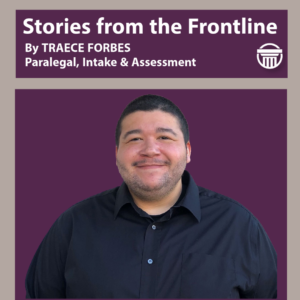 Greetings to all our readers,
Greetings to all our readers,
My name is Traece Forbes and I’m a paralegal from the Intake and Assessment unit, working on the frontline at Community Legal Aid SoCal. The Intake and Assessment unit is the first level of contact for the majority of our clients. Through this regular column I will share stories about how we are able to help self-represented litigants and how often times clients who don’t need extensive services are able to address their issue through advice from us.
The following story depicts what many litigants went through as a result of the court closure. It helps to highlight what a resource we are for the community and how people are able to get answers to their legal questions with ease, especially during the pandemic when many other resources can be difficult to contact or access.
Moving Out of Limbo
Finalizing a divorce during the pandemic
By Traece Forbes
Maria (fictious name) called us at the CLA SoCal Intake & Assessment unit to seek assistance with finalizing a divorce she started in late 2019. When the Covid-19 pandemic caused the courts to shutdown starting in spring of 2020, it left many litigants with filed cases stuck in a limbo. Maria’s divorce was one such case.
In my interview with Maria, she told me how in early 2019 her husband Louis-David (fictious name) was deported to France due to criminal convictions and that he cut off all contact with her. When she started her divorce in 2019, she was able to have a petition for service by posting and publication granted, which then allowed her to complete service without having to go through the lengthy process of serving Louis-David in France and having to follow the Hague convention.
She expressed concern that she would have to restart the entire divorce process and erase everything she had previously done. She wanted to know if her case was still open and, secondly, how she could finalize the divorce if the case was still, in fact, open. Unfortunately, Maria didn’t have her case number as she didn’t keep many of the forms she filed, but I was able to find it by using the filing date she provided.
After finding Maria’s case, I was able to see that it was not only still open but that she had already filed her proof of service on the posting and publication, meaning she was close to finalizing the divorce. In addition to her case still being open, Louis-David never responded to the divorce. This meant that Maria could default on him, which would make finalizing the divorce even easier.
At Intake and Assessment we informed her that her case was still open and gave her the last forms she would need to finalize her divorce. Maria was ecstatic and relieved to get the advice from the attorney and hear how not only that her divorce was still open, but also that she was near the end of the dissolution process. Although Maria wasn’t able to be given an appointment for help with completing the final forms for her divorce, she felt capable enough to do it on her own after receiving the advice and referrals from us. She stated she was excited and feeling empowered to finally complete the divorce and move on with her life.
1 Hague Convention: The Hague Convention is a lengthy process one must complete if they have to serve someone outside of the US and it can extend the time it takes to finalize your divorce so it isn’t the preferred avenue when it comes to serving court documents.


